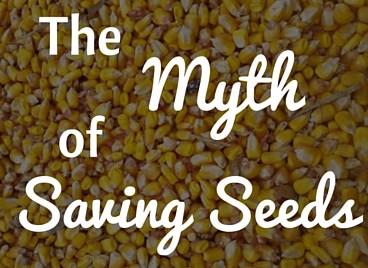No, Farmers Don't Want to Save Seeds
The following is an excerpt of Amanda Zaluckyj's article from her blog TheFarmersDaughterUSA.com.
 One of the biggest myths surrounding the adoption of biotechnology in agriculture is that farmers are no longer legally allowed to “save seeds” because of patents on the GMO traits.
One of the biggest myths surrounding the adoption of biotechnology in agriculture is that farmers are no longer legally allowed to “save seeds” because of patents on the GMO traits.
Here’s the deal. When a company like Monsanto develops a new GMO crop variety, they usually obtain a patent on it from the federal government. That patent allows them to control the use of the seeds containing the GMO technology. When purchasing the seed covered by a patent, farmers sign a Technology Agreement with the seed company. Among other things, that agreement restricts farmers from saving part of their crop and using it as seed in a subsequent year. Instead, farmers have to purchase new seed directly from the company if they wish to once again plant a GMO crop variety.
This has caused many opposed to biotechnology to cry foul. They believe that this agreement prohibiting the use of a crop as seeds takes away the fundamental rights of farmers. They believe the prohibition on saving seeds is costly for farmers, because it forces them to purchase new seeds. It prohibits what was once a common practice among farmers and puts power into the hands of a few seed companies. Finally, they see it as some type of time-honored practice by farmers that allowed them to be self-sufficient and self-reliant.
Fortunately, none of those concerns are realized and this is really a non-issue for farmers.
AN OLD (MOSTLY OUTDATED) PRACTICE
Although people associate the prohibition of keeping seed and reusing it the following production year, the reality is that this practice went out the window with the advent of hybrid varieties in the 1930’s. In a nutshell, hybrids are the result of taking two sexually-compatible species of plants and mating them to create a new species. Breeders then select the plants that exhibit beneficial traits and use them to create new varieties. The Honey-Crisp Apple, a relatively new apple variety, was developed using this method.
The problem with reusing these seeds is in the genes.
Without getting too deep in genetic science here, suffice to say that the second generation of plants do not always exhibit the beneficial traits the hybrids were bred to exhibit.
Read the full text of the blog post at The Farmer's Daughter blog site.